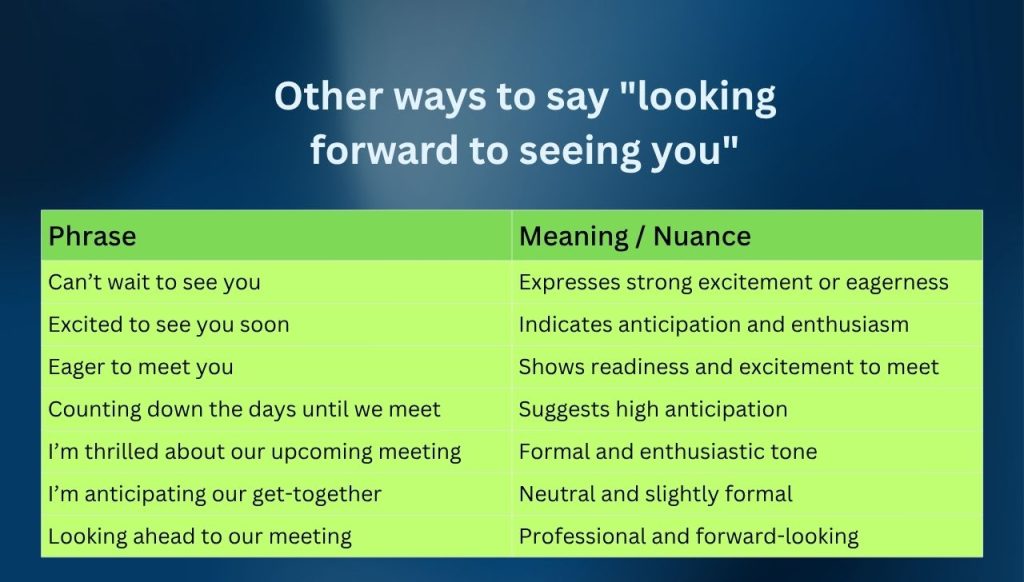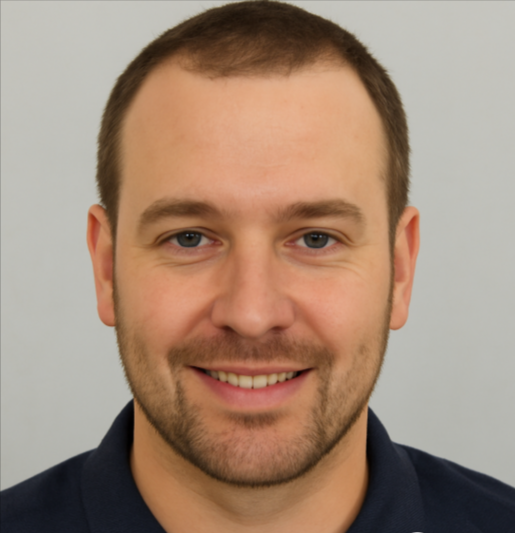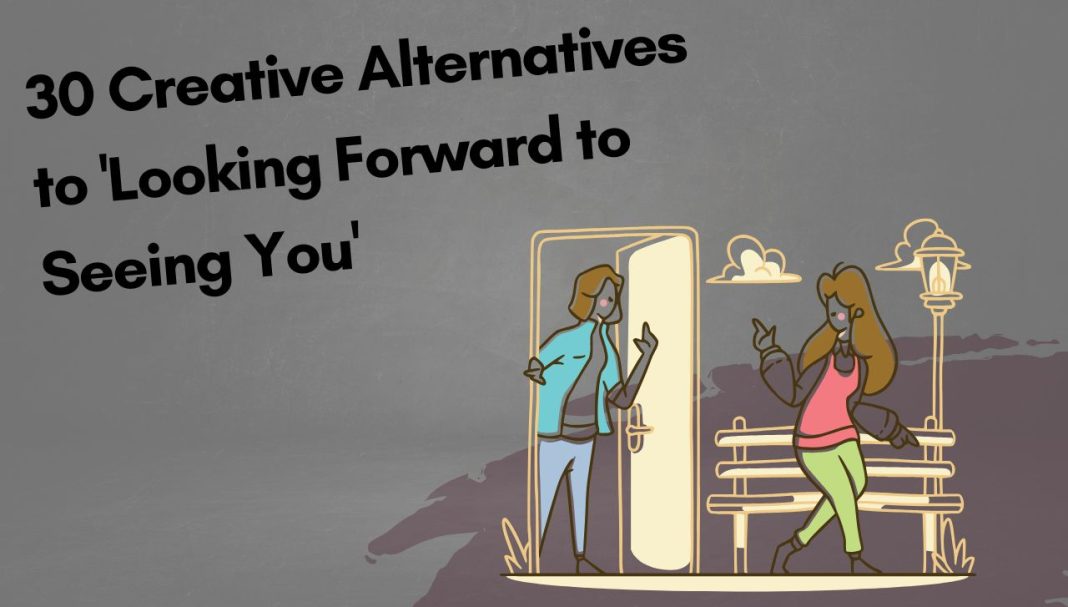“Looking forward to seeing you” is a classic—safe, polite, and used by everyone, from your boss to your best friend. But let’s be honest, sometimes it feels a little… stale. Whether writing an email, texting a friend, or closing a formal invite, switching up your wording can add a personal touch or hit the right tone. Maybe you want something warmer, more playful, or different. Whatever the reason, having a few fresh phrases up your sleeve can help you sound more sincere—and a little less like a copy-paste robot.
Looking Forward to Seeing You” Meaning
This phrase shows excitement about meeting someone. Simple as that. It says, “Hey, I’m happy we’re going to see each other.” It works in both formal and casual settings. But depending on who you’re talking to, you might want to use a version that sounds more fresh or natural.
When to Use “Looking Forward to Seeing You”
Here are the usual spots:
- Work: Ending an email, prepping for a meeting, or chatting before an event.
- Friends: Planning a catch-up or outing.
- Romantic: Texting your date or partner.
- Family: Ahead of a weekend visit or holiday gathering.
If the meeting is already set, this phrase adds a nice human touch. It says you’re not just showing up—you actually care.
Why Say “Looking Forward to Seeing You”
It’s about connection. In a sea of dry messages, this one feels personal. It does a few things well:
- Strengthens bonds
- Shows thoughtfulness
- Sets a friendly tone
- Eases tension before you meet
But say it too often, and it loses its shine. Time for some variety.

Other ways to say “looking forward to seeing you”
| Phrase | Meaning / Nuance |
|---|---|
| Can’t wait to see you | Expresses strong excitement or eagerness |
| Excited to see you soon | Indicates anticipation and enthusiasm |
| Eager to meet you | Shows readiness and excitement to meet |
| Counting down the days until we meet | Suggests high anticipation |
| I’m thrilled about our upcoming meeting | Formal and enthusiastic tone |
| I’m anticipating our get-together | Neutral and slightly formal |
| Looking ahead to our meeting | Professional and forward-looking |
| Happy to be meeting you soon | Polite and positive |
| Can’t wait to catch up | Casual, for friends or acquaintances |
| It’ll be great to see you again | Friendly and warm |
| I’m awaiting our meeting with pleasure | Formal and gracious |
| Really looking forward to our time together | Emphasizes shared time and connection |
| I’m keen to see you | British-style, indicates interest |
| Hoping to see you soon | Slightly tentative, polite |
| Delighted at the thought of seeing you | Very enthusiastic and expressive |
| It’ll be nice to reconnect | Casual, for acquaintances or friends |
| I’m glad we’ll be meeting | Simple and polite |
| I’m enthusiastic about our upcoming meeting | Professional and optimistic |
| Can’t wait to reunite | Often used for friends or loved ones |
| Anxious (in a good way) to see you | Colloquial, playful |
| Eagerly awaiting our meeting | Slightly poetic, expressive |
| I’m so looking forward to our chat | Friendly, especially for informal meetings |
| Counting the hours until we meet | Very eager, emotional |
| Happy to finally meet you | For first-time meetings |
| It’ll be great to finally connect | Often used in networking or professional settings |
| I’ve been wanting to see you | Suggests longstanding anticipation |
| I’m delighted to be seeing you soon | Very positive and polite |
| It’s going to be wonderful to see you | Warm and expressive |
| Our meeting can’t come soon enough | Very eager and impatient (in a fun way) |
| Looking forward to catching up in person | Commonly used after remote or online contact |
Conclusion
Language is connection—and how we say things matters. Switching up “looking forward to seeing you” doesn’t just freshen your message; it adds warmth, intention, and personality. The correct phrase can make someone feel genuinely welcomed, whether you’re writing formally or casually. So next time, don’t default to the usual—try something new, and see how much more engaging your message feels.

James is a certified English teacher and vocabulary coach who believes that words are powerful tools for connection. With a background in journalism and education, he specializes in practical guides and vocabulary-building techniques that learners can apply in real life. He loves crossword puzzles and weekend hikes.


